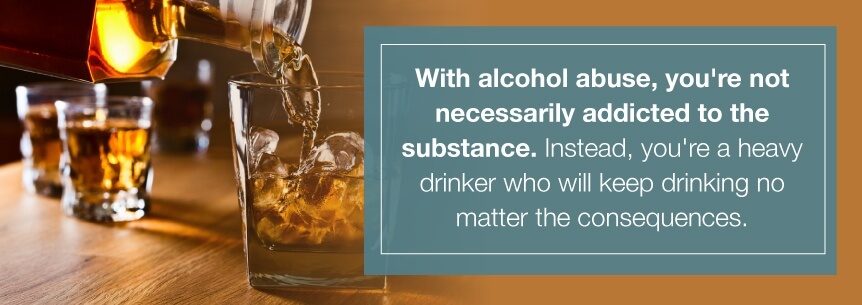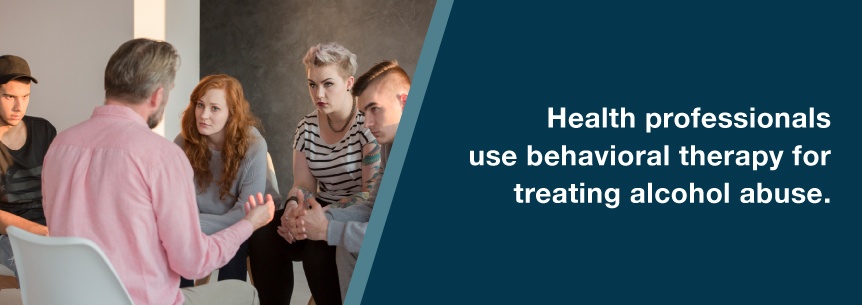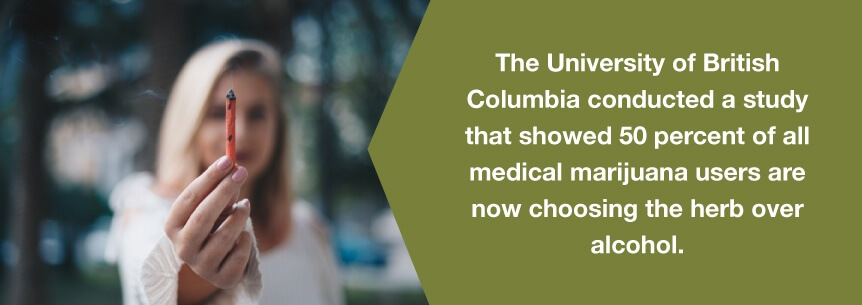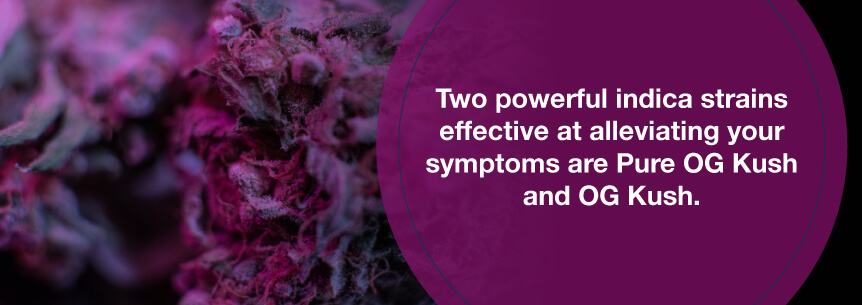From a celebratory toast of a victory to unwinding after a hard day’s work, alcohol has firmly fixed itself in American society. While alcohol abuse isn’t quite the same as alcoholism, it can lead to some of the same debilitating withdrawal symptoms. Researchers are finding medical marijuana treatment can help ease alcohol abuse symptoms and take the pain out of the withdrawal process.
Alcohol abuse can be just as troublesome as alcoholism and turn into a serious problem. It’s a pattern where you drink too much alcohol at any given time. It interferes with everyday life. You could be struggling with it regardless of whether you abuse alcohol frequently throughout the week or you drink too much at one time. It can also harm your relationships if you can’t stop drinking and even leave you unable to function in the workplace or other areas of your life.
Alcohol abuse can lead to alcoholism or physical dependency on alcohol. And, if you drink too much at once, it can result in alcohol poisoning.
Now, not all people who drink alcohol will necessarily become addicted. But some individuals seem to be more susceptible to addiction than others.
While they are closely related and symptoms can overlap, alcohol abuse and alcoholism aren’t the same things. Alcoholism is where you’re physically and psychologically dependent on alcohol. You build up a tolerance to it and will even continue to drink despite alcohol-related problems.

With alcohol abuse, you’re not necessarily addicted to the substance. Instead, you’re a heavy drinker who will keep drinking no matter the consequences. Alcohol abusers might not drink every day. For instance, they may only drink once during the week, but when they do drink, they put themselves in a risky situation, or they may drink enough to cause issues like alcohol poisoning. Some people who abuse alcohol will eventually become an alcoholic.
You’re abusing alcohol when:
Those suffering from alcohol abuse don’t always experience the same symptoms. The symptoms you experience will depend on certain factors, like your medical history or genetic makeup. Although symptoms of alcohol abuse do vary, specific signs can indicate a problem such as having:
Research on alcohol abuse identifies five types of alcohol abuse. It also shows younger adults make up half of Americans who abuse alcohol.
The five alcohol abuse types are:
The first sip of your drink causes alcohol to enter your bloodstream. You can feel the effects of alcohol typically within 10 minutes. Your blood alcohol concentration (BAC) level increases as you drink. This is how much alcohol you have in your bloodstream. You’re more impaired by the effects of alcohol the higher your BAC.
Physical effects of abusing alcohol may include:
Continued alcohol abuse may also cause liver disease — cirrhosis.
Alcohol abuse can lead to:
Those who abuse alcohol for a long time could begin experiencing the long-term effects of alcohol, including alcohol use disorder.
When drinking becomes a problem, a doctor can diagnose the problem as a medical “alcohol use disorder” or AUD. This is a chronic relapsing brain disease marked by things like:
Around 16 million individuals in the U.S. have AUD, according to the National Institute on Alcohol Abuse and Alcoholism (NIAAA).
According to the National Council on Alcoholism and Drug Dependence, Inc. (NCADD):
Alcohol abuse has been around as long as alcohol has existed — that is to say, thousands of years. China produced fermented beverages back in 7000 B.C. Ancient Greek literature discusses the dangers of abusing alcohol. The U.S. tried to avoid these dangers by passing a law in 1920 prohibiting just about anything related to alcohol — except for medical reasons. During Prohibition, doctors wrote whiskey prescriptions for patients who weren’t using it as the label directed. People were consuming many gallons of alcohol during that time via prescriptions alone. Prohibition was repealed in 1933.
To this day, approximately millions of people struggle with alcohol abuse and alcohol continues to be a serious threat to our society.
If you have a genetic predisposition to or a family history of alcohol abuse, you’ll likely have to work more than others at limiting or resisting alcohol. Ways you can reduce your consumption of alcohol include:
If you’re struggling with alcohol abuse, your first step is to recognize your need for help. Research shows those who abuse alcohol can benefit from treatment of some form. But each person is different and treatment works differently for each person. The sooner you receive treatment, the better.
Some forms of alcohol abuse treatment are:
Health professionals use behavioral therapy for treating alcohol abuse. This can be through counseling, support groups or both. Usually, there are no side effects to therapy, other than having to spend the time in sessions.

Your doctor may prescribe medication to help you reduce or stop your drinking. Some examples of medication are:
Naltrexone
Naltrexone blocks alcohol’s good feelings, reduces your urge to drink and prevents you from drinking heavily. If you take a higher dose than directed, it could cause liver damage. Let your doctor know if you experience any of these symptoms:
Acamprosate
Acamprosate helps keep your cravings for alcohol to a minimum after you’ve stopped drinking. Some side effects of this medication include:
Disulfiram
This could also help keep you from drinking. However, it doesn’t take away the compulsion to drink or cure alcohol use disorder if your drinking has turned into this condition. If you consume alcohol while taking this medication, it can cause a physical reaction such as:
The difference between disulfiram and the other two medications above is it makes you feel sick if you drink while you’re on it.
Vivitrol
Vivitrol is a form of naltrexone. The doctor gives you an injection once monthly. While this medication may come in pill form, the drug’s injectable form is much easier to consistently use when you’re struggling with alcohol abuse.
Both inpatient and outpatient alcohol abuse treatment centers are available.
Inpatient treatment
Inpatient treatment at an alcohol rehab center is designed to help you when you abuse alcohol or have become addicted. You stay at the center for a specific period. Many offer both short- and long-term treatment.
You’ll start off with a period of detoxification during treatment. Detoxification removes the alcohol from your body and gets rid of your physical dependency to it.
When you’re struggling with alcohol abuse, to complete the treatment program successfully, you must have a full understanding of your problem with alcohol to leave the center. You’ll receive support through both individual and group therapy.
While in a therapy session, you’ll explore the reasons behind your alcohol abuse and will be given the tools and strategies to help you overcome this abusive behavior. Therapists and counselors at the treatment center are trained to provide you with healthier alternatives to drinking so you can move on to a more productive lifestyle.
Outpatient treatment
With outpatient treatment, you’ll also explore your destructive behavior in a safe environment. You often attend anonymous group meetings and other programs to help you overcome your problems. Outpatient centers are not controlled environments, so you still are exposed to outside temptations during your treatment. Because of this, an outpatient treatment program best suits those who have already gone through an inpatient treatment program successfully.
Current medications don’t address alcohol abuse as effectively as the medical community would hope. To change that, the University of Rhode Island College of Pharmacy will be conducting a new trial. Fatemeh Akhlaghi, the Ernest Mario Distinguished Chair in Pharmaceutic, is leading a team in testing medicine to treat alcohol abuse and alcohol use disorder.
In Vancouver, the University of British Columbia conducted a study that showed 50 percent of all medical marijuana users are now choosing the herb over alcohol which means, among weed users, the amount of drinking may decrease. And, while some individuals do party with both alcohol and cannabis, many other individuals are using cannabis instead of alcohol.

The underlying issue with withdrawing from alcohol is after a long period of binge drinking, your brain chemistry changes. In fact, NIAAA states alcohol intoxication may change the delicate balance of various neurotransmitter chemicals, leading to things like:
When you’re drinking continuously for many days or weeks, your brain begins adjusting to this constant state of intoxication. After, being sober is where you have an imbalance in your brain chemicals, leading to withdrawal symptoms.
A review published in the Annals of New York Academy of Sciences showed your cannabinoid receptors mediate these brain chemical changes after drinking alcohol long-term. As you may know, the marijuana plant contains powerful cannabinoids, providing diverse medicinal effects. Because of this, medical marijuana could become a direct treatment for alcohol abuse to help with the withdrawals symptoms.
When going through mild withdrawal from alcohol, you may experience symptoms such as:
When withdrawals are more severe, it could lead to delirium tremens and seizures.
Symptoms can impair your everyday function, affecting your work, home and social life.
Most of the evidence that cannabis is an effective medicinal treatment for delirium tremens is through its already proven ability to help specific symptoms or through experiencing its effects. Symptoms of delirium tremens medical weed can help with include:
You’ll find several marijuana strains that are effective at alleviating your symptoms. Two powerful indica strains are Pure OG Kush and OG Kush. But, there are other strains potentially helpful for combating alcohol abuse-related symptoms, including:
Strains for Nausea
Strains for Anxiety
Strains for Cravings
Strains for Depression
Strains for Insomnia

Your cannabis doctor or budtender can help you find a good strain to ease your symptoms.
Cannabis and alcohol abuse extracts might be a good starting point of introducing medical cannabis and cannabinoids into your bloodstream. Topicals don’t expose you to the harmful toxins and compounds associated with smoking the herb. Vaporizing and medicated edibles also help reduce these compounds.
Individuals say a good dose is one or two hits of cannabis in the morning and then again in the evening. Vapors are good substitutes if you don’t want to smoke your treatment. Another option is cannabis tea.
When looking for a cannabis doctor to help you get started with your marijuana treatment for alcohol abuse, look no further than MarijuanaDoctors.com. Here you can feel secure and confident about talking about your alcohol abuse problem with a qualified professional.
They’ll give you advice and your recommendation for medical cannabis for alcohol abuse. Then, you can search our directory for a medical marijuana dispensary to shop for your cannabis products. You can also shop for cannabis products here.
Find A Doctor Find A Dispensary